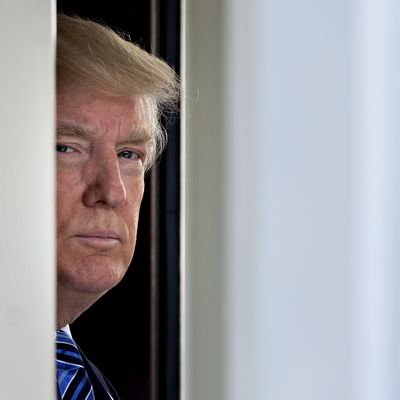
The legal conflict between Donald Trump and Special Counsel Robert Mueller is escalating rapidly. New reports in the Washington Post and New York Times are clear signals that Trump is contemplating steps — firing Mueller or issuing mass pardons — that would seem to go beyond the pale. Except: Trump’s entire career is beyond the pale and, in his time on the political stage, the unthinkable has become thinkable with regularity.
Trump’s actions are best understood in the context of the overwhelming likelihood he, his family members, and at least some of his associates are guilty of serious crimes. The investigation might not produce proof of criminal collusion with Russia’s illegal hacking of Democratic emails. (Though reasonable grounds for suspicion already exists in abundance.)
Where Mueller seems to be creating special pain for Trump is in his investigation of financial links between Russia, Trump, and other members of the president’s inner circle. In his interview with the New York Times Wednesday night, Trump threatened to fire Mueller if he probed into what Trump called financial matters unrelated to Russia. The Post reports that Mueller’s examination of Trump’s financial dealings is the president’s “primary frustration” and that Trump is “especially disturbed” that Mueller will access his tax returns.
Trump’s lawyers have stated explicitly what Trump hinted at in the interview: He regards an expanding of the probe as a red line that might cause him to fire Mueller. “The fact is that the president is concerned about conflicts that exist within the special counsel’s office and any changes in the scope of the investigation,” Sekulow said. A “close adviser” added, “If you’re looking at Russian collusion, the president’s tax returns would be outside that investigation.”
Trump’s team is not merely warning Mueller to stay away from random, unrelated transactions. They are specifically holding up Trump’s financial dealings with Russians as out of bounds: “They’re talking about real estate transactions in Palm Beach several years ago,” Sekulow tells the Post. “In our view, this is far outside the scope of a legitimate investigation.”
The Palm Beach transaction is a source of longtime suspicion. Trump purchased a property for $41 million and then, after improving it, sold it just two years later to a Russian oligarch for more than twice as much. This is a completely natural area for investigation. If the Kremlin wanted to finance Trump, overpaying for a property would be an obvious way to do so.
Mueller is also investigating other Trump financial transactions. Trump’s opaque business dealings include a lot of shady figures, including members of the Russian mafia. Why has Trump adamantly refused to disclose his tax returns, even at a significant cost to himself? And why does he appear to be so terrified at Mueller looking under these rocks? The simplest explanation is that he is probably hiding something deeply incriminating.
Trump has shown himself immune to widespread warnings that certain steps are simply not done. His hiding of tax returns, firing of U.S. Attorney Preet Bharara (who was investigating Russian financial crimes when he was let go), and ousting of FBI director James Comey were all steps that would seem to immolate his career. Ordering the Department of Justice to fire Mueller, or pardoning the targets of his investigations, would be an open announcement that Trump considers his financial ties to the Russian underworld and state to be beyond any legal accountability. The ominous threats emanating from the White House are that of an administration mobilizing for war against the rule of law.






























